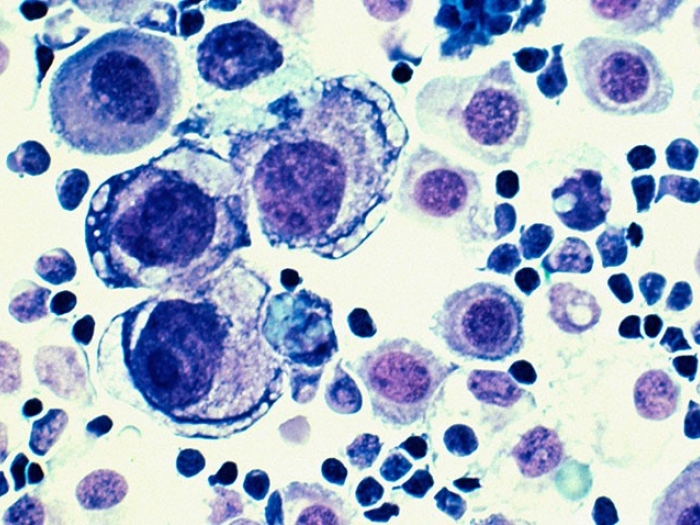The terms can be confusing — advanced cancer, metastatic cancer, late-stage cancer, stage 4 cancer, secondary cancer, recurrent cancer. Here’s what patients need to know.
11:13 AM
Author |

One of the most difficult things for patients and families to hear is that they or a loved one have an advanced form of cancer.
And doctors have a variety of ways of talking about advanced cancer: metastatic cancer, late-stage cancer, stage 4 cancer, secondary cancer, recurrent cancer.
Many of these terms overlap with each other — but they don't always mean exactly the same thing.
To better understand these concepts, the Michigan Health blog sat down with Daniel Wahl, M.D., Ph.D., a radiation oncologist at the University of Michigan Rogel Cancer Center who specializes in treating patients with aggressive brain tumors.
"The first thing that's important to know is that every patient is different," Wahl says. "What an advanced diagnosis means for an individual will depend on many factors. Some cancers that doctors consider advanced might be well-controlled and patients may have a good quality of life for years, even if a 'cure' is not possible."
Many cancer centers, including the Rogel Cancer Center, offer special resources to help patients and families with the physical, emotional, financial and practical concerns of an advanced cancer diagnosis.
Advanced cancer
Advanced cancer or advanced-stage cancer doesn't have a precise medical definition, Wahl says.
Doctors usually use the term to mean that the cancer is unlikely to be cured.
"This means that our medical efforts will be put toward keeping a patient as healthy and feeling as good as we can for as long as we can," he says. "For some patients, it means we'll be managing the cancer as a chronic illness for the rest of the patient's life."
MORE FROM THE LAB: Subscribe to our weekly newsletter
Metastatic cancer, secondary cancer
A cancer is said to be metastatic when it spreads from the part of the body where it started to another part of the body, Wahl says.
A cancer may start in the breast, for example, and is considered metastatic if it spreads to the lungs, or bones, or brain.
"It's important to note, that when breast cancer spreads to the brain, it's still considered to be breast cancer, not brain cancer," Wahl explains. "The types of treatments that are used to treat metastatic breast cancer still focus on the characteristics that are specific to breast cancer."
In this example, the primary cancer type is breast cancer. And the tumors that develop in other parts of the body are considered secondary cancers.
Late-Stage, Stage 4 Cancer
For most cancers, saying a cancer is metastatic is the same thing as a stage 4 diagnosis, Wahl says.
Staging systems are a type of precise shorthand used by doctors to describe a cancer's characteristics and progression. Many patients will be familiar with the most common staging system, which ranges from stage 0 — meaning abnormal cells that have not yet turned into cancer — to stage 4, which is the highest stage.
Some cancers that doctors consider advanced might be well-controlled and patients may have a good quality of life for years, even if a 'cure' is not possible.Daniel Wahl, M.D., Ph.D.
For many cancers, stages 1 through 3 indicate how much the cancer has spread into nearby tissues, while stage 4 means the cancer has spread to more distant parts of the body.
"If we think about the way the heart is pumping blood throughout the body, it helps to explain how cancer spreads, and why, for example, it spreads from the lungs to the brain so often," Wahl says. "If some of those cancer cells in the lung break off and enter the bloodstream, they get pumped throughout the body following the same route the blood takes. It also explains why other cancers, like kidney cancer, for example, might first travel to the lungs. They're following the path of the circulatory system."
Usually, stage 3 and stage 4 cancers are considered late-stage.
Recurrent cancer
Cancer is said to be recurrent when it comes back after a patient has received treatment that had rendered the cancer inactive or undetectable.
The cancer can come back in the same spot or in a different part of the body. And when it comes back it's usually harder to treat because it often has become resistant to the treatments that were initially used against it.
"I tell my patients that I've had patients with glioblastomas that I have treated, and sometimes we can push the recurrences off several years, but for some patients, those recurrences happen earlier — within a matter of weeks or months. And there's no way of knowing ahead of time precisely which it's going to be."
Advice for patients
Wahl offers these thoughts for patients and their families:
"None of us know exactly how an individual cancer is going to go. Some go very badly, some go very well — and there's always that range. That's important for a patient to know, even if you're told you have a metastatic cancer. On the flip side, if you are told you have an early, curable cancer, there is still a slight chance that things go worse than we expect. Having detailed conversations with your oncologist and having a healthy appreciation for the uncertainty in all of this is really, really important."
And, he adds, know that, based on your individual case, your doctor is going to do their best to ensure the best possible outcome for you.
Like Podcasts? Add the Michigan Medicine News Break to your Alexa-enabled device or subscribe for updates on iTunes, Google Play and Stitcher.

Explore a variety of healthcare news & stories by visiting the Health Lab home page for more articles.

Department of Communication at Michigan Medicine
Want top health & research news weekly? Sign up for Health Lab’s newsletters today!





